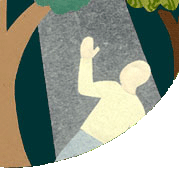 |

|

|
De uitdaging om alle waarheid te aanvaarden, waar we die ook moge vinden,
heeft nauwelijks betekenis tenzij we daarmee bedoelen dat God wil dat
we bepaalde waarheden aanvaarden van buiten onze eigen geloofstraditie.
Dat Joseph Smith open stond voor ervaringen en inzichten van andere geloofstradities,
moge blijken uit zijn gewilligheid om voorbij de christelijke traditie
zich te richten op Egyptische papyri en besloten genootschappen zoals
de Vrijmetselarij. Het Boek van Mormon leert dat God verschillende heilige
schriften aan verschillende volken heeft geopenbaard, en dat bij de samensmelting
van volken, hun geloofsovertuigingen "eveneens te zamen zullen gaan"
(2 Nephi 29:7-12).
Kerkelijke leiders bevestigden dat we Gautama Buddha, Confusius, Mohammed,
en de Protestantse Hervormers, en vele anderen, als geinspireerde leermeesters
beschouwen. Er word vaak gezegd dat zij God's waarheid slechts ten dele
uitdragen, maar dat geldt ook voor HLD profeten: ook de Herstelling is
een onvolledige openbaring die aan ons beperkte begrip tegemoet wil komen
(LV 1:24; Negende Artikel des Geloofs).
Naast het zich openstellen voor waarheid uit andere geloofstradities,
werden we opgedragen naar kennis in de wereld te zoeken m.b.v. de talenten
van kunstenaars, geleerden en wetenschappers (LV
88:118; 90:15). De kennis die ons uit dergelijke bronnen word geopenbaard
kan ons onwaarheden doen inzien die door degenen die ons voorgingen als
goddelijke leerstellingen werden beschouwd. Taalgebruik, zo waarschuwen
de schriften, is niet in staat uitdrukking te geven aan waarheid die ons
begrip te boven gaat (3 Nephi 28:13-14; LV 76:114-116).
Daaruit volgt dat, alhoewel we de verzekering krijgen dat alle waarheid
in een groot geheel kan worden samengevat, ons begrip in dit leven van
voorlopige en onvolledige aard moet zijn. Nu kijken we nog in een wazige
spiegel (1 Kor. 13:12).
| Aanverwante Onderwerpen:
|
 Slechts Eén Ware Kerk? Slechts Eén Ware Kerk? |
|
|
John Taylor: A man
in search of truth has no peculiar system to sustain, nor peculiar
dogma to defend or theory to uphold; he embraces all truth, and
that truth, like the sun in the firmament, shines forth and spreads
its effulgent rays over all creation, and if men will divest themselves
of bias and prejudice, and prayerfully and conscientiously search
after truth, they will find it wherever they turn their attention.
|
| Journal of Discourses
16:370 |
B. H. Roberts: God
. . . raises up prophets here and there among all the children of
men, of their own tongue and nationality, speaking to them through
means that they can comprehend.
. . . "Mormonism" holds,
then, that all the great teachers are servants of God; among all
nations and in all ages. They are inspired [individuals], appointed
to instruct God's children according to the conditions in the midst
of which he finds them. |
| Defense of the Faith
and the Saints (Salt Lake City: Deseret News, 1907), 1:512 |
Lowell L. Bennion:
Religion is not the only approach to truth or to an understanding
of life. Life is exceedingly complex, intricate, and far beyond
man's ability to comprehend. We need to look at it from all sides:
through the eyes of the scientist, the artist, the poet, the philosopher,
simple folk of common sense, and the prophet. No one of these can
give us a full view of life.
|
| An Introduction to the
Gospel (Salt Lake City: Deseret Sunday School Union Board, 1955),
261 |
Hugh B. Brown: The
honest investigator must be prepared to follow wherever the search
of truth may lead. Truth is often found in the most unexpected places.
He must, with fearless and open mind "insist that facts are
far more important than any cherished, mistaken beliefs." |
| Conference Report,
October 1962, 42 |
Hugh B. Brown: We
are at home with the most advanced truths discovered by scientists
and with all competent philosophic thought—with truth wherever
found—because our religion enjoins in us a love of knowledge
and education, encourages us to seek understanding through the broadening
of our vision and the deepening of our insight. |
| Conference Report,
April 1964, 81 |
Howard W. Hunter:
When we encounter apparent conflict in our studies and scholarly
work, it is because we see only a part of this great whole. Our
understanding of the truth we seek may be partial or limited. We
may hold an opinion or an idea about the world or human nature that
is not entirely true. When we encounter situations of seeming conflict,
we should not feel angry or discouraged, but rather we should confront
the matter with great optimism and hope. For we know that this apparent
conflict is only a prelude to a new understanding . . . |
| The Teachings of Howard
W. Hunter (Salt Lake City: Bookcraft, 1997), 183 |
|

|
 |
